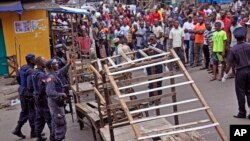Liberia’s armed forces chief of staff said the country’s new post-war military wants to be the army of the people, not one that willfully murders civilians and commits other human rights violations.
Brigadier General Daniel Ziakhan made the comments while discussing the guilty verdict given to five soldiers for their role in August's Ebola-related shooting in the West Point slum of Monrovia.
Soldiers opened fire and used tear gas on residents as they tried to stop the government from evacuating their commissioner during the Ebola quarantine of the community.
One person, a 16-year old boy, was killed and several others were wounded. A military disciplinary board found platoon commander Lt. Aloysius Quaye and four other soldiers guilty of failing to follow proper military procedures.
Ziakhan said their punishment will range from reduction in rank, forfeiture of two-thirds of Quaye’s salary for three months and 30 days detention.
"You know, military law all around will tell you that, as a platoon leader, you are responsible for what your platoon does, or failed to do. What happened here is that the platoon leader was a First Lieutenant. He has been reduced from First Lieutenant to Second Lieutenant. He will be put in jail; he will lose two-thirds of his salary for a few months, and then, of course, he will lose two months of seniority,” he said.
Ziakhan said the punishment for the four enlisted soldiers will be determined based on the gravity of the crimes they committed. But, he added that it will include a reduction in rank, 30 days in detention and letters of reprimand.
He said the punishment is in line with the Uniform Code of Military Justice.
There are some Liberians who believe the soldiers are being made scapegoats for the military’s overall incompetence and indiscipline.
The Liberia Independent National Human Rights Commission has reportedly recommended that President Ellen Johnson Sirleaf issue a public apology to the family of the young man who was killed during the shooting. The commission also wants the government to give the family financial compensation.
Ziakhan said the punishment is commensurate with the crime. He cited the case of the 2004 Iraq Abu Ghraib prison scandal, which involved physical, psychological, and sexual abuse of Iraqi prisoners by the U.S. military.
Ziakhan said General Janis Karpinski, the commander of Abu Ghraib, was only demoted for his lack of oversight regarding the abuse.
“General Karpinski was never put on a firing squad. His rank was reduced,” Ziakhan pointed out.
He said with Liberian military personnel serving in peacekeeping roles in other countries, the army wants to set an example for how its soldiers should conduct themselves.
“We want to punish people to send out a clear message. Remember, this is a new military. So, if you just allow people to get away with those violations, those crimes, we will be sending an unspoken message,” he said.
Ziakhan dismissed suggestions the soldiers in the West Point shooting were carrying out the orders of their superiors. He said the West Point shooting incident was an isolated one that should not be blamed on the indiscipline of the Liberian military.
“This is not what we were trained to do. We were trained and we are still being trained by the U.S. military. So, this is not what we were trained to do,” Gen. Ziakhan said.





